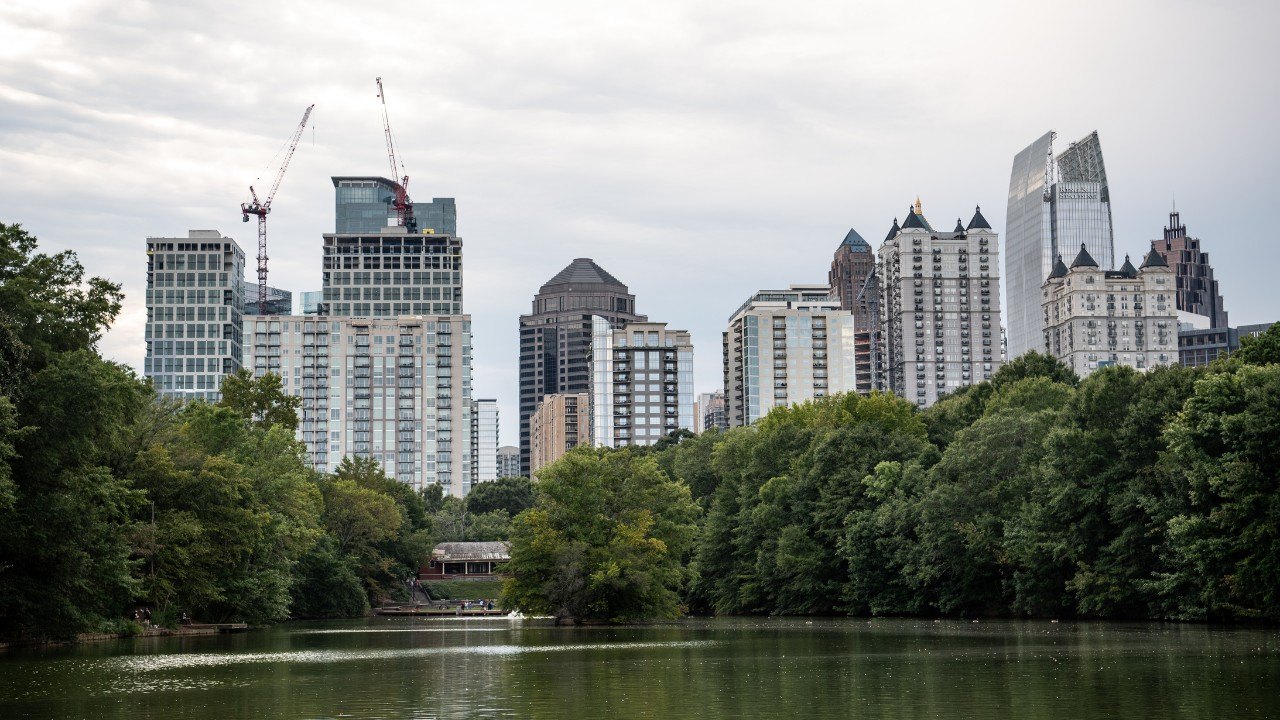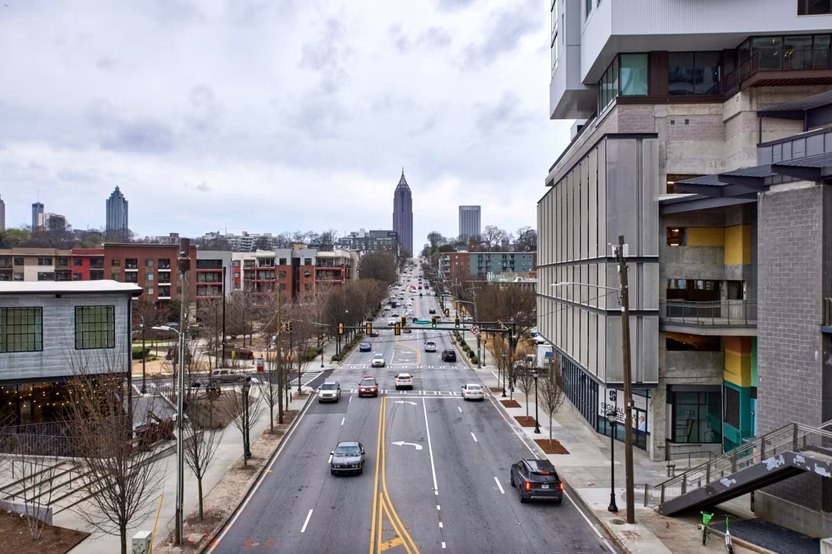The Data-Center Boom Eats Up a Lot of Land. Atlanta Says It’s Gone Too Far.


Prince Williams/WireImage
Adair Park, a spit of land just southwest of this city’s downtown, is a neighborhood on the rise. Part residential, part industrial, it sits next to a train station and the popular Beltline walking trail. Developers have trickled in to turn empty lots and run-down buildings into new housing, co-working space and retail shops.
But here, and across the Southeast’s biggest metropolitan area, demand for one type of real estate threatens to crowd out others: data centers.
Space to store and process data for everything people stream, scroll and swipe online is still in short supply. An artificial intelligence race among the world’s largest tech companies—the so-called “hyperscalers”—is driving a land rush for ever-larger computing facilities with plentiful power.
Data-center construction is growing faster in Atlanta than in just about any other major city. Measured by power capacity, it was up 76% in the metro area during the first half of 2024 compared with the same period a year prior, according to real-estate firm CBRE.
Meta, Alphabet’s Google, Microsoft and Elon Musk’s X all operate Atlanta area data centers, or are planning new ones. X secured a $10 million local tax break for an expansion this year.

Matt Odom for Wall Street Journal
These firms and many other tech companies and property investors are attracted by the city’s cheap electricity, state tax incentives and existing fiber-optic infrastructure.
Now, Atlanta is pushing back. More residents and lawmakers worry that the pace of data-center growth—and the amount of land and resources being devoted to it—has gone too far. They say it is starting to compete with more pressing real estate needs, like housing and retail stores.
In September, the city council banned new data centers from opening in neighborhoods near transit and the Beltline. An ordinance that would have created an exception to allow data centers in Adair Park was withdrawn this month.
“Data Center development cannot be prioritized over people-centered urban development, including affordable housing, quality jobs, and neighborhood retail,” Atlanta Mayor Andre Dickens wrote in a letter addressing the legislation.
Still, that might not significantly derail new construction, much of which is happening outside of the city limits. By 2028, the Atlanta metro’s data-center inventory will grow to a power load of more than 4,000 megawatts, more than 30 times the metro’s data center load in 2012, according to real-estate data firm Green Street.
Nationally, the data-center sector has also flourished, even as property investor enthusiasm has waned for nearly every other type of real estate during this period of higher interest rates.
Total data-center inventory increased by an annual average of 43% during the years 2023 and 2024. That is compared with a less than 3% average increase in the total stock of multifamily buildings, hotels, self-storage and other property types over the same period, Green Street said.
Other cities and states where builders are creating new facilities en masse could follow in Atlanta’s footsteps by placing new limits on data centers. Fairfax County, in data-center mecca Northern Virginia, recently banned new centers from being built within one mile of rail stations.
“The amount of growth we’ve seen the last few years, it’s really starting to catch people off guard,” said David Guarino, a data property analyst at Green Street.
Analysts say that devoting more space for computing and artificial intelligence is inevitable. As AI moves from training models to what the industry calls “inference” (when AI really starts working and becomes commercially viable), companies will require even more space and power than they do today. That could push more providers into places with the fastest possible internet connectivity, which tend to be major population centers.
Most of all, data center operators are flocking to places that court their business.

Matt Odom for Wall Street Journal
“Nobody wants zoning issues, challenges to their development,” said Chris Gatch, an executive at Atlanta-based data-center operator DC Blox, which is developing two data centers in suburbs outside of Atlanta’s city limits. “These are big investments and bets. So you want to go where you know you’ve got a smooth path.”
Data-center expansion has also been a boon to some office owners, who have filled empty floors by leasing to these companies. And private-equity firms such as Blackstone, which in 2021 bought the major data-center developer QTS, have ushered in a new era of big-money legitimacy for the once niche property sector.
But Atlanta lawmakers say that rapid growth comes at a price. Unchecked data facility construction would make it harder for the city to address its housing shortage, which totals some 100,000 units in the greater metro, according to one 2022 estimate. Residents echo those concerns.
“I think the city is recognizing that data centers, while they provide some value to abandoned office buildings, they don’t really, long-term, add to the city’s vibrancy or housing,” said Matthew Garbett, a member of the Adair Park Neighborhood Association and a co-founder of urban planning advocacy group ThreadATL.
Garbett pointed to several projects in the neighborhood where worn-out properties on large lots were successfully converted to community-oriented uses. A former school was turned into affordable housing. A shelving factory was redeveloped into apartments, offices and shops. And a struggling shopping mall, purchased by the city, will make way for a new hotel, apartments and retail, according to a recent development proposal.
Data centers are still finding new markets that welcome them. Amazon Web Services said earlier this year it would invest $10 billion in new data centers near Jackson, Miss., and Microsoft debuted plans recently for three data centers around New Albany, Ohio.
The majority of states offer some form of incentive for data centers, according to the Data Center Coalition, an industry trade group. Georgia, for example, offers sales tax benefits on equipment purchases, which can cost hundreds of millions of dollars at a single site. Data-center proponents say property and other tax revenues generated by centers more than make up for what is lost from sales tax forgiveness.
But tax benefits are getting more scrutiny lately. Georgia’s Republican-led state legislature earlier this year passed a temporary repeal of data-center sales tax benefits, though it was ultimately vetoed by Republican Gov. Brian Kemp.
Shaw Blackmon, a Republican in the Georgia House of Representatives, said some people were concerned that devoting too much of the state’s power capacity to data centers could mean less resources for other industries that create more jobs than data centers, which are often light on permanent staff.
“If we had an industry with a large number of jobs that came looking…is that going to impact their decision to come to Georgia?” Blackmon said.
Georgia Power, the top utility company in that state, said this month that the power requests of potential economic development projects, which are predominantly data centers, could total 36,500 megawatts by the mid-2030s. Today, the utility has a total capacity of 21,500 megawatts, generated and purchased. The utility plans to publish a report with more details on how it will meet future demand in January.
“There isn’t a single utility provider out there that isn’t being overburdened by requests,” said Guarino, the Green Street analyst.
Categories
Recent Posts











"My job is to find and attract mastery-based agents to the office, protect the culture, and make sure everyone is happy! "
1637 Racetrack Rd # 100, Johns, FL, 32259, United States
